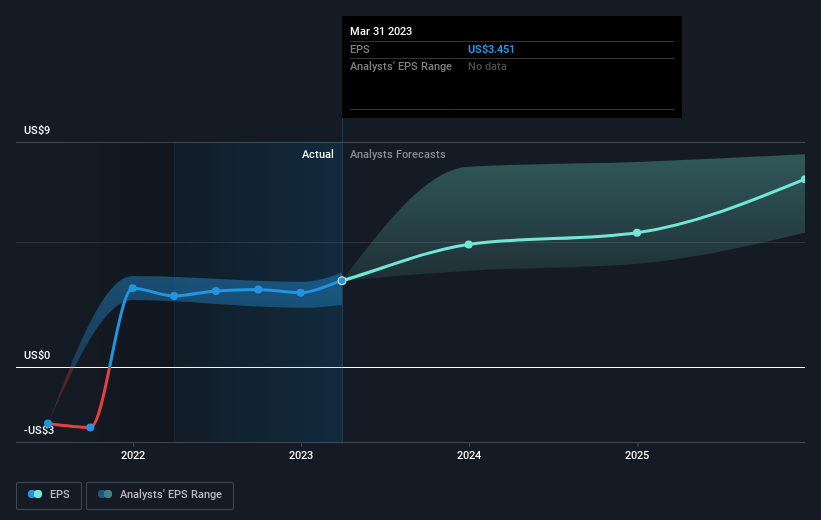The 33% return delivered to Bristol-Myers Squibb's (NYSE:BMY) shareholders actually lagged YoY earnings growth
When you buy and hold a stock for the long term, you definitely want it to provide a positive return. Furthermore, you'd generally like to see the share price rise faster than the market. Unfortunately for shareholders, while the Bristol-Myers Squibb Company (NYSE:BMY) share price is up 14% in the last five years, that's less than the market return. Zooming in, the stock is actually down 11% in the last year.
The past week has proven to be lucrative for Bristol-Myers Squibb investors, so let's see if fundamentals drove the company's five-year performance.
See our latest analysis for Bristol-Myers Squibb
In his essay The Superinvestors of Graham-and-Doddsville Warren Buffett described how share prices do not always rationally reflect the value of a business. One way to examine how market sentiment has changed over time is to look at the interaction between a company's share price and its earnings per share (EPS).
During five years of share price growth, Bristol-Myers Squibb achieved compound earnings per share (EPS) growth of 44% per year. The EPS growth is more impressive than the yearly share price gain of 3% over the same period. Therefore, it seems the market has become relatively pessimistic about the company.
You can see how EPS has changed over time in the image below (click on the chart to see the exact values).
It is of course excellent to see how Bristol-Myers Squibb has grown profits over the years, but the future is more important for shareholders. Take a more thorough look at Bristol-Myers Squibb's financial health with this free report on its balance sheet.
What About Dividends?
When looking at investment returns, it is important to consider the difference between total shareholder return (TSR) and share price return. Whereas the share price return only reflects the change in the share price, the TSR includes the value of dividends (assuming they were reinvested) and the benefit of any discounted capital raising or spin-off. Arguably, the TSR gives a more comprehensive picture of the return generated by a stock. In the case of Bristol-Myers Squibb, it has a TSR of 33% for the last 5 years. That exceeds its share price return that we previously mentioned. And there's no prize for guessing that the dividend payments largely explain the divergence!
A Different Perspective
While the broader market gained around 15% in the last year, Bristol-Myers Squibb shareholders lost 8.4% (even including dividends). Even the share prices of good stocks drop sometimes, but we want to see improvements in the fundamental metrics of a business, before getting too interested. On the bright side, long term shareholders have made money, with a gain of 6% per year over half a decade. If the fundamental data continues to indicate long term sustainable growth, the current sell-off could be an opportunity worth considering. It's always interesting to track share price performance over the longer term. But to understand Bristol-Myers Squibb better, we need to consider many other factors. Case in point: We've spotted 2 warning signs for Bristol-Myers Squibb you should be aware of.
We will like Bristol-Myers Squibb better if we see some big insider buys. While we wait, check out this free list of growing companies with considerable, recent, insider buying.
Please note, the market returns quoted in this article reflect the market weighted average returns of stocks that currently trade on American exchanges.
Have feedback on this article? Concerned about the content? Get in touch with us directly. Alternatively, email editorial-team (at) simplywallst.com.
This article by Simply Wall St is general in nature. We provide commentary based on historical data and analyst forecasts only using an unbiased methodology and our articles are not intended to be financial advice. It does not constitute a recommendation to buy or sell any stock, and does not take account of your objectives, or your financial situation. We aim to bring you long-term focused analysis driven by fundamental data. Note that our analysis may not factor in the latest price-sensitive company announcements or qualitative material. Simply Wall St has no position in any stocks mentioned.
Join A Paid User Research Session
You’ll receive a US$30 Amazon Gift card for 1 hour of your time while helping us build better investing tools for the individual investors like yourself. Sign up here



